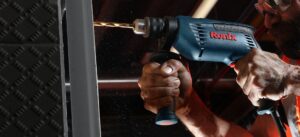In the event that you are someone who enjoys doing things on your own and possesses a tiny workshop at home, you absolutely need to have woodworking tools. Not only can they make your work simpler and more efficient, but they also assist you in achieving results that are more precise and accurate. In the following blog post, we will discuss the significance of woodworking tools for home workshops of a smaller size, as well as the considerations that should be taken into consideration while selecting these tools.
Why every small home workshop needs woodworking tools
Whether you’re a beginner or an experienced woodworker, having the right tools is essential to achieving your desired outcome. Here are some reasons why every small home workshop needs woodworking tools:
- Efficiency: Woodworking tools such as saws, drills, and routers can make your work much faster than manual tools, allowing you to complete your projects in a shorter amount of time.
- Precision: With the help of woodworking tools, you can achieve a higher degree of accuracy in your cuts and joints, leading to a more professional-looking finished product.
- Versatility: Woodworking tools come in many different types and sizes, each designed for a specific task. This range of tools allows you to be more versatile in the projects you take on, and also makes it easier to switch between tasks quickly.
- Creative freedom: With woodworking tools, you can let your creativity take flight and produce unique pieces that showcase your personal style.
Important factors to consider when choosing tools
With so many woodworking tools out there, it can be overwhelming to choose the right one for your needs. Here are some factors to consider when making your selection:
- Budget: Your budget will determine how many and what type of tools you can buy. It’s important to remember that quality tools may cost more upfront but can last you a lifetime.
- Space: Consider the size of your workshop before buying tools. You don’t want to invest in a large tool that won’t fit or will take up too much space.
- Project requirements: Think about the type of projects you usually take on and what tools would be necessary for those tasks. Prioritize buying tools that will be useful for your most common projects.
- Quality: Quality is crucial when it comes to woodworking tools. Look for tools made from durable materials, with solid construction, and well-reviewed by other woodworkers.
In conclusion, woodworking tools are essential for every small home workshop. They increase efficiency, precision, versatility, and creative freedom, allowing you to take on unique and challenging projects. When choosing tools, remember to consider your budget, space restrictions, project requirements, and quality.
Power Drills

If you’re someone who likes DIY projects and has a small workshop at home, power drills are a must-have. They make your work easier and faster, and they also help you achieve more precise and accurate results. In this blog post, we’ll explore the world of power drills and what you should consider when choosing the right one for your small home workshop.
Types of power drills and their uses
Before deciding on which power drill to buy, it’s important to know the different types and their uses:
| Type | Uses |
|---|---|
| Drill driver | For drilling holes and driving screws in wood, metal, and plastic |
| Hammer drill | For drilling holes in concrete or tough masonry |
| Impact driver | For driving long screws and bolts into dense materials like hardwood and metal |
| Right-angle drill | For drilling in tight spaces, corners, and angles |
Top power drills for small home workshops
Here are some of the top power drills that are ideal for small home workshops:
- DeWalt DCD771C2: A versatile drill driver that’s compact, lightweight, and has a long battery life.
- Bosch 11255VSR: A powerful hammer drill that can tackle tough masonry jobs with ease.
- Makita XDT131: An excellent impact driver that’s highly efficient and durable.
- DeWalt DCD791D2: A high-performing right-angle drill that’s versatile and easy to use.
When choosing a power drill, consider your budget, power requirements, and the type of projects you’ll be working on. Look for drills that are well-reviewed by other woodworkers and made from high-quality materials. With the right power drill, you can take on any DIY project with ease and precision.
Circular Saws
If you’re someone who enjoys woodworking and DIY projects, a circular saw is a great addition to your small home workshop. It makes cutting wood and other materials a breeze, and it also helps you achieve accurate and even cuts. In this blog post, we’ll take a closer look at circular saws and what you should consider when choosing the right one for your small home workshop.
Circular saws vs table saws
When it comes to cutting wood, there are two main types of saws: circular saws and table saws. While table saws are great for large-scale projects and precise cuts, circular saws are a more versatile option for smaller jobs and portability. Circular saws are also more affordable and take up less space than table saws.
Which is better for small home workshops?
If you have limited space in your home workshop, or if you mostly work on smaller projects, a circular saw is likely the better choice. They are portable, easy to use, and can handle a variety of cuts. However, if you have the space and budget for a table saw, it can be a worthwhile investment for more precise cuts and larger projects.
Top circular saws for small home workshops
Here are some of the top circular saws that are ideal for small home workshops:
- DEWALT DCS391B: A lightweight and versatile circular saw that’s perfect for cutting wood and other materials.
- Bosch CS10: An affordable and durable circular saw that’s great for beginners or occasional users.
- SKIL 5280-01: An affordable and powerful circular saw with a laser guide for more precise cuts.
- Makita XSS02Z: A high-quality and reliable circular saw with a powerful motor and ergonomic design.
When choosing a circular saw, consider your budget, the type of projects you’ll be working on, and the safety features included. Look for circular saws with good reviews from other woodworkers and made from high-quality materials. With the right circular saw, you’ll be able to tackle any DIY project with ease and precision.
Reciprocating Saws and Jigsaws
If you’re passionate about woodworking and DIY projects, you probably already know the importance of having the right tools. Two versatile and useful saws that you might be considering to purchase are the reciprocating saw and jigsaw. In this blog post, we’ll take a closer look at these saws, their differences, and top picks for your small home workshop.
Reciprocating saws and jigsaws
Reciprocating saws and jigsaws are power tools that are designed to make cutting tasks more manageable with less manual effort. The reciprocating saw blade moves back and forth in a push and pull motion, making it ideal for rough cutting tasks like demolition, pruning, and cutting materials like metal and plastics. A jigsaw blade, on the other hand, moves up and down, making it ideal for intricate cuts and curves in wood, metal, and plastics.
Their differences and uses
The main difference between a reciprocating saw and jigsaw is the type of blade motion. Reciprocating saws have a more aggressive push and pulling motion and use longer blades, while jigsaws move in a more controlled and precise up-and-down motion and use shorter blades. Reciprocating saws are better for rough cuts and demolition, while jigsaws are better for intricate and detailed cuts.
Top reciprocating saws and jigsaws for small home workshops
If you’re looking for a reciprocating saw or jigsaw for your small home workshop, here are some top picks:
- Milwaukee M18 Fuel Sawzall: A powerful and durable reciprocating saw with excellent battery life and easy blade change.
- Bosch JS260: A high-quality and affordable jigsaw with tool-free blade change and adjustable speed control.
- DEWALT DCS367B: A compact and powerful reciprocating saw with variable speed control and tool-free blade change.
- BLACK+DECKER BDEJS600C: A budget-friendly and versatile jigsaw with several orbital settings and adjustable speed control.
When choosing a reciprocating saw or jigsaw, consider your budget, the type of projects you’ll be working on, and the safety features included. Look for saws with good reviews from other woodworkers and made from high-quality materials. With the right saws, you’ll be able to tackle any woodworking project with ease and precision.
Sanders

If you’re into woodworking or DIY projects, you may know how essential it is to have the right tools. One of the most important tools is a sander. Sanders are used to smooth and shape wood, remove paint and varnish, and prepare surfaces for finishing. In this blog post, we’ll take a closer look at different types of sanders, their uses, and top picks for your small home workshop.
Different types of sanders and their uses
There are different types of sanders available for different purposes. Here’s a quick overview:
| Type of Sander | Uses |
|---|---|
| Belt sander | Great for removing large quantities of wood or leveling surfaces |
| Random orbit sander | Ideal for sanding curved or rounded edges and achieving a smooth surface |
| Disc sander | Good for sanding small, detailed areas and achieving precise angles |
| Sheet sander | Best for final finishing and sanding large, flat surfaces |
Top sanders for small home workshops
If you’re looking for a sander for your small home workshop, here are some top picks:
- Bosch ROS20VSC: This random orbit sander is easy to use and highly versatile, with adjustable speed control and low-vibration technology.
- PORTER-CABLE 352VS: A reliable and durable belt sander with variable speed and a dust collection bag.
- Makita BO4556K: A budget-friendly and lightweight sheet sander that provides a smooth finish on flat surfaces.
- JET J-4002: A powerful and versatile combination belt and disc sander for more extensive projects.
When choosing a sander, consider your budget, the size of your project, and the type of surfaces you’ll be sanding. Look for sanders with good reviews from other woodworkers and made from high-quality materials. With the right sanders, you’ll be able to achieve a smooth and beautiful finish on all your woodworking projects.
Planers
If you’re planning to work with wood for your next DIY project, then a planer is an essential tool that can help you achieve smooth and accurate surfaces. In this blog post, we’ll explore different types of planers, their uses, and recommend some top picks for your small home workshop.
Types of planers and their uses
Planers come in various types, each designed for a specific purpose. Here’s a quick overview:
| Type of Planer | Uses |
|---|---|
| Benchtop planer | Ideal for woodworking enthusiasts to plane large boards and create precise thicknesses |
| Handheld planer | Useful for small woodworking tasks where precision and portability are essential, such as door trimming or smoothing uneven surfaces |
| Jointer planer | Designed to flatten, square, and straighten the edges of rough or warped lumber |
Top planers for small home workshops
If you’re shopping for a planer for your small home workshop, here are some top picks:
- DEWALT DW735X: A powerful and reliable benchtop planer with three knife cutterheads and a versatile dust collection system.
- Bosch PL1632: A lightweight and compact handheld planer that’s perfect for trimming doors or smoothing uneven surfaces in tight spaces.
- WEN 6552T: An affordable and sturdy benchtop planer with a two-blade cutting system and easy-to-adjust infeed and outfeed tables.
- PORTER-CABLE PC160JT: A jointer planer that’s compact and easy to use, with a variable speed range for better control and accuracy.
When selecting a planer, consider the size of your project, the amount of material to be removed, and the type of wood you’re using. Look for high-quality build materials, easy blade adjustments, and safety features. With the right planer, you can turn rough wood into smooth and beautiful pieces for your projects.
Routers
If you’re looking to add some finesse to your woodworking projects, a router can help you achieve professional-looking finishes on edges and surfaces. In this blog post, we’ll break down the different types of routers and recommend some top picks for your small home workshop.
Different types of routers and their uses
Routers come in various shapes, sizes, and types, each designed for specific tasks. Here are the most common ones:
| Type of Router | Uses |
|---|---|
| Fixed base router | Ideal for straight cuts, edge profiling, and basic joinery work |
| Plunge base router | Allows for more precise and versatile cuts, such as stop cuts, stair trenching, and inlay work |
| Combo router kit | Includes both fixed and plunge base, providing the flexibility to tackle a wide range of cuts and applications |
Top routers for small home workshops
Here are some of our top router picks for your small home workshop:
- DEWALT DWP611: A versatile and compact router with a variable speed control that allows for precise and efficient cuts.
- Bosch 1617EVSPK: A combo router kit with a powerful motor and a comfortable grip design that provides stability and control.
- Makita RT0701CX7: A lightweight and easy-to-use router with a soft start feature that reduces start-up torque and increases accuracy.
- PORTER-CABLE 690LR: A fixed base router with a durable and ergonomic design that makes it ideal for heavy-duty applications.
When selecting a router, consider the type of cuts you’ll be making, the size and depth of the materials, and the level of control and precision you require. Look for features such as dust collection, easy depth adjustments, and compatibility with different bit sizes. With the right router, you can take your woodworking game to the next level.
Hand Tools
If you’re just starting out in woodworking, or working in a small home workshop, it’s important to have a set of high-quality hand tools. Hand tools can help you achieve precise cuts and shapes, and they’re often more affordable than power tools. In this blog post, we’ll discuss some essential hand tools for small home workshops and recommend some top picks for beginners.
Essential hand tools for small home workshops
Here are some must-have hand tools for small home workshops:
- Saw: A handsaw or a backsaw can help you make accurate and clean cuts in wood. Choose a saw with a comfortable grip and sharp teeth.
- Chisels: Chisels are essential for shaping and carving wood. Look for a set of chisels with different sizes and shapes.
- Hammer: A hammer is useful for driving nails and adjusting joints. Choose a hammer with a comfortable grip and a balanced weight.
- Screwdriver: A screwdriver is useful for driving screws and adjusting hardware. Choose a set of screwdrivers with different sizes and types.
- Clamps: Clamps can hold your pieces in place while you work on them. Choose a set of clamps with different sizes and lengths.
Top hand tools for small home workshops
Here are some of our top hand tool picks for beginners:
- Stanley 20-045: A versatile handsaw with a triple ground tooth design that provides efficient and smooth cuts.
- Narex 853053: A set of four chisels made from high-quality carbon steel, with ergonomic handles that provide comfort and control.
- Estwing E3-16S: A durable and balanced hammer with a one-piece steel construction that reduces vibrations and fatigue.
- Klein Tools 85074: A set of eight screwdrivers with precision-machined tips and cushion-grip handles that provide torque and comfort.
- Bessey GSCC2.524: A set of four clamps with a sturdy and lightweight design, and a sliding arm that allows for easy adjustments and pressure distribution.
When selecting hand tools, consider the quality of the materials, the ergonomics of the handles, and the versatility of the designs. Look for tools that feel comfortable and well-balanced in your hands, and that can tackle a wide range of tasks and materials. With the right hand tools, you can refine your woodworking skills and create beautiful pieces on a budget.
Hand Tools
If you’re just starting out in woodworking, or working in a small home workshop, it’s important to have a set of high-quality hand tools. Hand tools can help you achieve precise cuts and shapes, and they’re often more affordable than power tools. In this blog post, we’ll discuss some essential hand tools for small home workshops and recommend some top picks for beginners.
Essential hand tools for small home workshops
If you’re new to woodworking, there can be a lot of tools to choose from. Here are some must-have hand tools to get you started:
- Saw: A handsaw or a backsaw can help you make accurate and clean cuts in wood. Choose a saw with a comfortable grip and sharp teeth.
- Chisels: Chisels are essential for shaping and carving wood. Look for a set of chisels with different sizes and shapes.
- Hammer: A hammer is useful for driving nails and adjusting joints. Choose a hammer with a comfortable grip and a balanced weight.
- Screwdriver: A screwdriver is useful for driving screws and adjusting hardware. Choose a set of screwdrivers with different sizes and types.
- Clamps: Clamps can hold your pieces in place while you work on them. Choose a set of clamps with different sizes and lengths.
Top hand tools for small home workshops
Here are some of our top hand tool picks for beginners:
- Stanley 20-045: A versatile handsaw with a triple ground tooth design that provides efficient and smooth cuts.
- Narex 853053: A set of four chisels made from high-quality carbon steel, with ergonomic handles that provide comfort and control.
- Estwing E3-16S: A durable and balanced hammer with a one-piece steel construction that reduces vibrations and fatigue.
- Klein Tools 85074: A set of eight screwdrivers with precision-machined tips and cushion-grip handles that provide torque and comfort.
- Bessey GSCC2.524: A set of four clamps with a sturdy and lightweight design, and a sliding arm that allows for easy adjustments and pressure distribution.
When selecting hand tools, it’s important to choose tools that feel comfortable and well-balanced in your hands as well as consider the quality of the materials, and the versatility of the designs. With these essential hand tools and some top picks, you can get started on your small woodworking projects.
Combining the right tools for your small home workshop
It’s important to note that everyone has their own preferences when it comes to choosing tools. While our top picks can be a good starting point, you’ll soon find that you may need additional tools that are tailored to your specific projects. Make sure to build your collection of hand tools over time and add to it as you grow in skill and experience.
Conclusion
Having the right hand tools is essential to starting out in woodworking and crafting beautiful pieces in your small home workshop. The essential hand tools we recommend include a saw, chisels, hammer, screwdriver, and clamps. Our top picks for beginners offer great quality and design for their price points. But remember, every woodworker has unique needs, and you’ll develop your own preferences over time as you gain experience. We hope this guide has given you a good foundation for building your collection of essential hand tools.

I’m James Brown, the founder and editor of DIYINUSE.COM. I have over 15 years of hands-on woodworking and DIY experience that I share through tips and project inspiration on my website. When I’m not working on home improvement projects or creating content for the site, I enjoy spending time outdoors hiking and fishing. I’m always looking to expand my creativity and DIY skills by learning new techniques.
